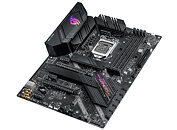Wednesday, February 10th 2021

Intel B460 and H410 Incompatibility with "Rocket Lake" Explained
Earlier this week, Intel shook the DIY PC market, particularly the vast mainstream segment, by revealing that its mid-tier B460 and entry-level H410 desktop motherboard chipsets will not be compatible with 11th Gen Core "Rocket Lake-S" processors, and that only its top-tier Z490 and H470, will. We have an explanation into what's going on, after consulting with people in the know, thanks to our friends at Hardware Zone Israel, who spoke with sources within Intel. It turns out, that some batches of B460 and H410 PCH dies are re-badged from older generations of PCH, and built on the 22 nm silicon fabrication process; whereas the Z490 and H470 are based on a newer generation that's built on 14 nm. This is similar to Intel's move to carve out the B365 chipset from the older H170.
In addition to being limited to an older version of Intel ME (Management Engine), the H460 and H410 PCH lack the ability to communicate with "Rocket Lake-S" processors over side-band, using PMSYNC/PMDN signals, a design change Intel introduced with the "Tiger Lake" and "Rocket Lake" microarchitectures. The chipsets faced no such limitation with "Comet Lake-S." Intel's decision to re-badge older 22 nm-class PCH silicon as B460 and H410 may have been dictated by the company's 14 nm node volume constraints. HotHardware reports that some motherboard vendors, such as GIGABYTE, found a clever (albeit expensive) way around this limitation, by creating "V2" revisions of their existing B460 and H410 motherboards, which actually use the 14 nm H470 chipset.
Source:
Hardware Zone Israel
In addition to being limited to an older version of Intel ME (Management Engine), the H460 and H410 PCH lack the ability to communicate with "Rocket Lake-S" processors over side-band, using PMSYNC/PMDN signals, a design change Intel introduced with the "Tiger Lake" and "Rocket Lake" microarchitectures. The chipsets faced no such limitation with "Comet Lake-S." Intel's decision to re-badge older 22 nm-class PCH silicon as B460 and H410 may have been dictated by the company's 14 nm node volume constraints. HotHardware reports that some motherboard vendors, such as GIGABYTE, found a clever (albeit expensive) way around this limitation, by creating "V2" revisions of their existing B460 and H410 motherboards, which actually use the 14 nm H470 chipset.

59 Comments on Intel B460 and H410 Incompatibility with "Rocket Lake" Explained
www.guru3d.com/news-story/likely-not-all-z490-motherboard-will-support-rocket-lake-s-processors.html
Oh well, even if it isn't, my plan was a 10900 or so.
I don't see this series as a worth wild venture from 10900k unless it's near free.Poor inventory keeps amd prices high if amd flooded the market like they did 30 series we'd see price drops just as we do on 30 series.
I'm an AMD user, i was prepared to switch to ZEN3 but the MSRP wanst for me, and i had stock in my country to buy, but the prices made no sense.
MSRP after 6-8 months usually doesn't mean much if sells are low one just has to wait for the price to drop which is the hard part for most :-)